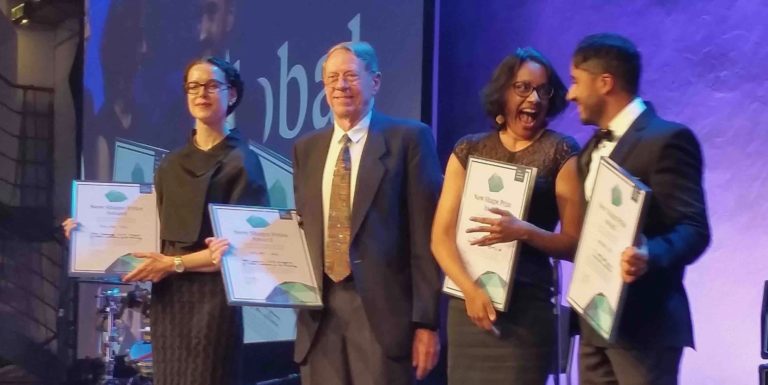Who gets a say in how the world deals with global catastrophic risks?
I spent a few days in Stockholm at the end of May at the New Shape Forum, where more than 200 people from all around the world gathered to share ideas about how to manage the big 30,000-foot high global threats.
Our host was the Global Challenges Foundation, founded in 2012 by the Hungarian-born Swedish financial analyst Laszlo Szombatfalvy. He’d made his fortune by designing and applying a financial-market risk calculation and valuation model. Now 90 years old, he focuses his philanthropy on global catastrophic risks: threats with the potential to reduce the human population by 10 percent or more.
Opinion research the foundation has commissioned shows a surprising amount of support for increasing global efforts and coordination to deal with these risks. But conversations at the Forum made equally clear that the world needs new global risk governance models that more directly involve citizens.
The global economy may well have become much flatter, in Thomas Friedman’s words, as developing countries have entered global markets. But governance of global catastrophic risks has not.
We spent three days in discussions and workshops, examining how well existing institutions are managing risks like weapons of mass destruction, climate change, unchecked population growth, pandemics, and politically motivated violence.
We also engaged with the 14 finalists for the New Shape Prize –a $5 million pool of funds to support innovation in global governance. The foundation received an astonishing 2,700 submissions from 122 countries.
I was struck by how many of the proposals honed in on one particular problem: that the loftier and grander institutions and global efforts get, the less connected “ordinary” citizens feel. And without the active participation of global citizens, the odds of success are much lower.
Can Individuals Make a Difference?
A 2017 GCF opinion survey across eight countries (Australia, Brazil, China, Germany, India, South Africa, the United Kingdom, and the United States found that three quarters of adults considered themselves to be global citizens, and substantially agreed that individuals could make a difference. An astonishing 85 percent said that they cared about responding to global risks.
Six in ten respondents considered the world to be more insecure it was than two years earlier. Only 54 percent were confident that the current international system could make the decisions needed to address global risks. In other words, people are very worried -particularly about weapons of mass destruction, politically motivated violence, and climate change. (Despite the US administration’s withdrawal from the Paris Accord on climate change, the issue still was the third most concerning to American respondents.)
Overall, 62 percent of adults -and even higher numbers among men and older participants- also felt that only organizations or groups could be effective against global risks.
Perhaps what surprised me most was that seven of ten adults (71%) were in favor of creating a new global organization to respond to global risks. In the United States, the percent has jumped considerably over the past few years, to 67 percent from 49 percent in 2014. Perhaps that’s because of the way the United Nations has been used as a political football, but given the United States’ longtime attitudes about its own sovereignty and global leadership, this struck me as unusual.
As for the United Nations itself, six out of ten adults said they were confident in it, but nevertheless 85 percent overall thought it needed reforms to improve its ability. More than 90 percent of respondents in Brazil and India thought so.
At the same time, 62 percent of adult respondents believed they could personally make a difference on global issues. The number was even higher among people who considered themselves to be global citizens, among women and young people, and in most emerging countries. (China was an outlier, with only 47 percent of adults saying they could make a difference.) Nearly as many –58 percent overall—felt that a single individual could negatively impact global cooperation on catastrophic risks.
Are these results contradictory? Yes and no. Individuals can feel that they have a role, but that for such a role to be effective, others need to behave similarly in a way that organizations and groups are much better prepared to catalyze.
The New Shape Prize
At the closing dinner May 29, the foundation awarded $1.8 million to three projects aimed at reforming global institutions. The winning proposals reflected the need to bringing more citizens into decision making and connect them with multinational groups with the power to act.
Soushiant Zanganehpour’s “AI-supported global governance through bottom-up deliberation” uses blockchain technology to confirm the identities of voters in a decentralized global, participatory and deliberative system.
“Global governance and the emergence of global institutions for the 21st century,” by Augusto Lopez-Claros, Arthur Lyon Dahl and Maja PCE Groff, would reform the United Nations General Assembly to make it directly elected by popular vote, while adding a second civil society-focused chamber.
Natalie Samarasinghe’s project, “A truly global partnership – helping the UN do itself out of a job,” brings businesses, non-governmental organizations (NGOs) and young people into a new UN governance structure. Meanwhile, the UN would transfer its development work to these stakeholders.
Global Challenges Foundation executive director Carin Ism was frank in her remarks concluding the conference: the foundation knows that its odds of success are very small. However, as she pointed out, when the potential impact is big, even a miniscule chance at succeeding becomes worth a try.
- The Gray Rhino Wrangler on Substack - January 1, 2025
- Gray Rhino Risks and Responses to Watch in 2024 - January 10, 2024
- In the Media 2023 - December 31, 2023


